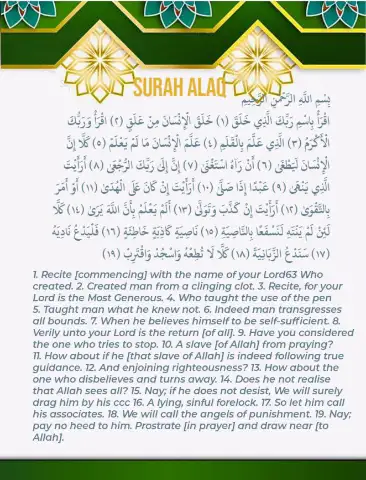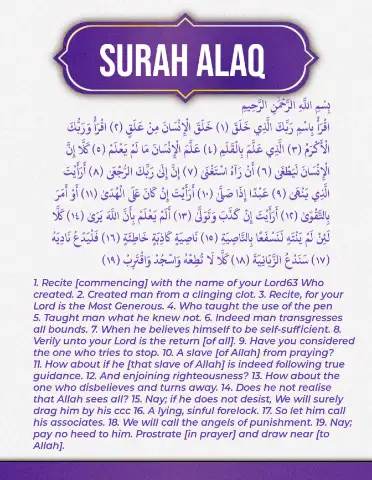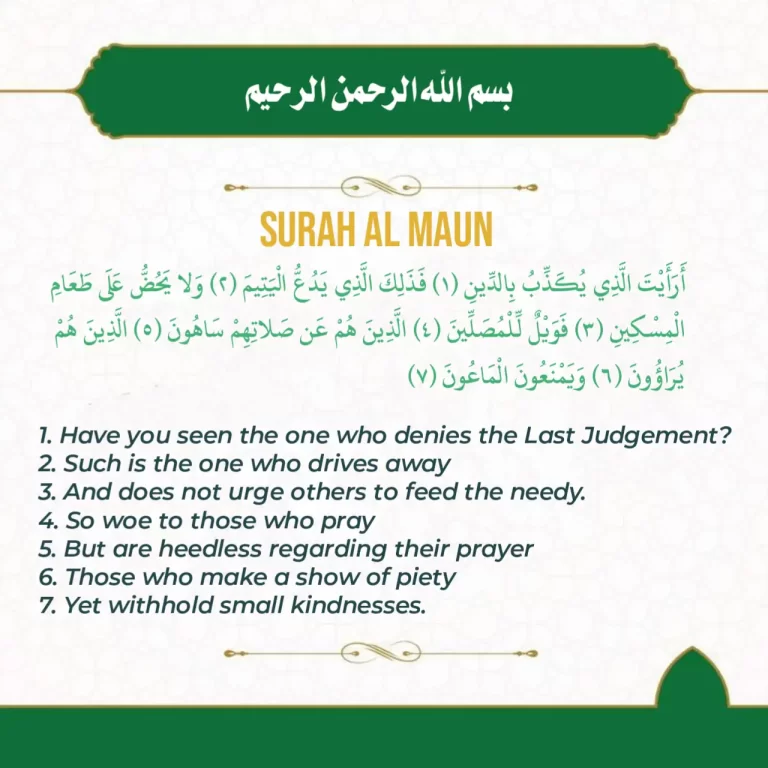Iqra Bismi Rabbika Surah Translation, Arabic Text, And Transliteration
Iqra Bismi Rabbika Surah or Surah Al-ʻAlaq or Congealed Blood, also known as The Clot or The Clinging Thing, is the 96th chapter of the Qur’an. It is composed of 19 verses. It is sometimes also known as Surah Iqra.
Advertisements
Iqra Bismi Rabbika Surah Translation In English
- Recite [commencing] with the name of your Lord Who created.
- Created man from a clinging clot.
- Recite, for your Lord is the Most Generous.
- Who taught the use of the pen.
- Taught man what he knew not.
- Indeed man transgresses all bounds.
- When he believes himself to be self-sufficient.
- Verily unto your Lord is the return [of all].
- Have you considered the one who tries to stop.
- A slave [of Allah] from praying?
- How about if he [that slave of Allah] is indeed following true guidance.
- And enjoining righteousness? How about the one who disbelieves and turns away.
- Does he not realise that Allah sees all?
- Nay; if he does not desist, We will surely drag him by his ccc.
- A lying, sinful forelock.
- So let him call his associates.
- We will call the angels of punishment.
- Nay; pay no heed to him.
- Prostrate [in prayer] and draw near [to Allah].
Iqra Bismi Rabbika Full Surah Transliteration
- Iqra bismi rab bikal lazee khalaq
- Khalaqal insaana min ‘alaq
- Iqra wa rab bukal akram
- Al lazee ‘allama bil qalam
- Al lamal insaana ma lam y’alam
- Kallaa innal insaana layatghaa
- Ar-ra aahus taghnaa
- Innna ilaa rabbikar ruj’aa
- Araaital lazee yanhaa
- Abdan iza sallaa
- Ara-aita in kana ‘alal hudaa
- Au amara bit taqwaa
- Ara-aita in kaz zaba wa ta walla
- Alam y’alam bi-an nal lahaa yaraa
- Kalla la illam yantahi la nasfa’am bin nasiyah
- Nasiyatin kazi batin khaatiah
- Fal yad’u naadiyah
- Sanad ‘uz zabaaniyah
- Kalla; la tuti’hu wasjud waqtarib.
Iqra Bismi Rabbika Lazi Khalaq In Arabic
بِسْمِ اللَّهِ الرَّحْمَٰنِ الرَّحِيمِ
- اقْرَأْ بِاسْمِ رَبِّكَ الَّذِي خَلَقَ (١)
- خَلَقَ الْإِنْسَانَ مِنْ عَلَقٍ (٢)
- اقْرَأْ وَرَبُّكَ الْأَكْرَمُ (٣)
- الَّذِي عَلَّمَ بِالْقَلَمِ (٤)
- عَلَّمَ الْإِنْسَانَ مَا لَمْ يَعْلَمْ (٥)
- كَلَّا إِنَّ الْإِنْسَانَ لَيَطْغَىٰ (٦)
- أَنْ رَآهُ اسْتَغْنَىٰ (٧)
- إِنَّ إِلَىٰ رَبِّكَ الرُّجْعَىٰ (٨)
- أَرَأَيْتَ الَّذِي يَنْهَىٰ (٩)
- عَبْدًا إِذَا صَلَّىٰ (١٠)
- أَرَأَيْتَ إِنْ كَانَ عَلَى الْهُدَىٰ (١١)
- أَوْ أَمَرَ بِالتَّقْوَىٰ (١٢)
- أَرَأَيْتَ إِنْ كَذَّبَ وَتَوَلَّىٰ (١٣)
- أَلَمْ يَعْلَمْ بِأَنَّ اللَّهَ يَرَىٰ (١٤)
- كَلَّا لَئِنْ لَمْ يَنْتَهِ لَنَسْفَعًا بِالنَّاصِيَةِ (١٥)
- نَاصِيَةٍ كَاذِبَةٍ خَاطِئَةٍ (١٦)
- فَلْيَدْعُ نَادِيَهُ (١٧)
- سَنَدْعُ الزَّبَانِيَةَ (١٨)
- كَلَّا لَا تُطِعْهُ وَاسْجُدْ وَاقْتَرِبْ (١٩)
Summary Of Iqra Bismi Rabbika Surah
| Classification | Mecca |
| Number of verses | 19 |
| Order | 96th |
| Position | Juz 30 |
| Surah Before | Surah Teen |
| Names | The Embryo, the clot |

Which Was The First Surah Revealed?
Surah Alaq which starts with iqra Bismi Rabbika was the first surah of the Qur’an to be revealed to the Messenger of Allah (SAW).
It was revealed to him at the beginning of his prophethood, when he did not know anything about the Book or about faith.
Iqra Bismi Rabbika Meaning
Angel Jibreel came to him with the message and commanded him to recite, but he refused, saying, 1 am not a reciter.
Advertisements
But Jibreel kept urging him until he recited.
Then Allah revealed to him the words:
Recite [commencing] with the name of your Lord Who created)) all of creation.
Then He singles out man and mentions the beginning of his creation, from a clinging clot.
Advertisements
The One Who created man and cared for him must also care for him by issuing commands and prohibitions, which He did by sending the Messenger (SAW ) to them and sending down the Books to them.
Hence after the command to recite, He mentions His creation of man.
Then He says:
Advertisements
Recite, for your Lord is the Most Generous) that is, He is possessed of the most sublime attributes and is very generous and kind.
Part of His kindness is that He taught the use of the pen, Who taught the use of the pen, taught man what he knew not for He brought him forth from his mother’s womb not knowing anything.
And He gave him hearing, sight and intellect, and made available to him the means of acquiring knowledge.
So He taught him the Qur’an, and He taught him wisdom, and He taught him the use of the pen, through which knowledge is preserved and rights and duties are regulated.
And messages are exchanged between people so that they do not have to speak directly to one another.
All praise be to Allah, Who has bestowed these blessings upon His slaves, for which they cannot give sufficient thanks.
Moreover He has blessed them with independence of means and abundant provision.
But because of man’s ignorance and wrongdoing, when he thinks that he is independent of means, he transgresses and behaves arrogantly, turning away from true guidance.
He forgets that he will return to his Lord and he does not fear punishment; perhaps he may even go so far as to reject guidance himself and call others to reject it and tell them not to pray, which is the best act of faith.
Allah says to this stubborn and rebellious one:
Have you, O man who tells someone not to pray, considered…
How about if he namely the slave of Allah who is praying is indeed following true guidance by knowing the truth and acting upon it, and enjoining righteousness upon others?
Is it appropriate to try to stop someone who is like this?
Is it not the case that trying to stop him is one of the worst forms of opposition towards Allah and towards the truth?
Such a thing cannot be done except by someone who himself is drifting away from guidance, or he tells others to do things that are contrary to piety.
How about if the one who tells someone not to pray disbelieves and turns away from the truth?
Does he not fear Allah and His punishment?
Does he not realise that Allah sees all that he does?
Then Allah warns him, if he persists in his ways:
Nay; if he does not desist and give up what he is saying and doing.
We will surely drag him by his forelock that is, We will surely seize him violently by his forelock, and he deserves that, for it is a lying, sinful forelock that is, he is lying in what he says and sinning in what he does.
So let him namely this person who deserves that punishment call his associates that is, his companions and friends, and the people around him, to help him deal with what has befallen him.
We will call the angels of punishment that is, the keepers of hell, to seize him and punish him.
Then let him see which of the two groups is stronger and more capable.
This is the situation of the one who tells someone not to pray, and this is the punishment of which he is warned.
As for the one who is told not to pray, Allah commands him not to listen to this person who tells him not to pray, and to pay no attention to him, as He says:
Nay; pay no heed to him?, for he is not enjoining anything but that which leads to loss in this world and the hereafter.
Prostrate [in prayer])? to your Lord (fand draw near [to Allah])? in prostration and in other acts of worship, for they all bring one closer to attaining His pleasure and bring one nearer to Him.
This is general in meaning and applies to everyone who tells one not to do acts of worship, even though it was originally revealed concerning Abu Jahl when he told the Messenger of Allah (SAW) not to pray and tried to disturb him and harm him.
This is the end of the commentary on Surah Alaq (Iqra Bismi Rabbika surah).
All praise and thanks are for Allah, and may the blessings and peace of Allah be upon Prophet Muhammad (SAW), his family, and his Companions abundantly until the Day of Judgement.
Advertisements








One Comment